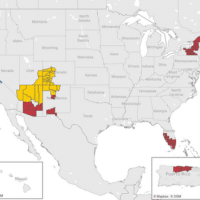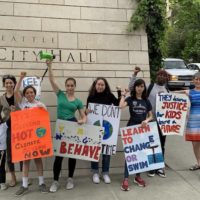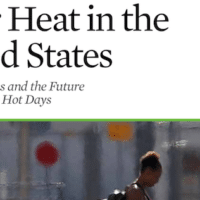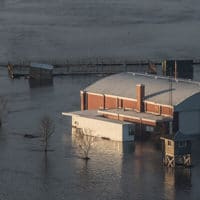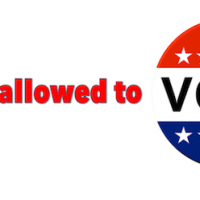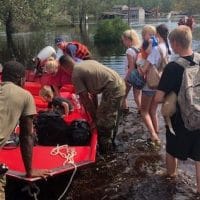-
President Trump’s cabinet of polluters, frackers and climate crisis deniers rushes to gut protections
In his address to Congress this week, President Trump boasted about ending “environmental restrictions that were making our country far less safe and totally unaffordable.”
-
33,147,744 people in the United States currently face extreme weather alerts
Climate change is making weather more extreme. This tool shows how many people across the United States face risks right now from wildfires, flooding, tropical storms, or extreme heat.
-
Can we still limit global warming to 1.5°C? Here’s what the latest science says
Is it still possible to limit future global warming to 1.5°C above pre-industrial levels? Or has that ship sailed?
-
More heat this weekend–more inequities of keeping cool
This summer, dangerous heat seems like it’s not letting up.
-
What Bill Gates has wrong about “advanced” nuclear reactors
If nuclear power needs to be part of the climate solution, why not continue to use what we have? I understand the reactors that we have are aging out. But why not either shore those up or use the same design that we currently have where we wouldn’t have to go through the lengthy and costly development phase?
-
ExxonMobil versus Chevron: Fight for second-to-last place among fossil fuel companies has begun
As the weather grows warmer, bears, birds, and corporate America begin to emerge from their respective hibernations. Bears will awaken hungry with thoughts of berries; birds will fly north, reversing their southern migration; corporate America will prepare their proxies and ballots. Soon it will be annual general meeting (AGM) season.
-
Ask an expert: Congress plans to spend billions on dangerous, unnecessary nuclear weapons
This week is the 75th anniversary of the U.S. bombing of Hiroshima and Nagasaki, the only time nuclear bombs have been used in a conflict—and one could only hope the last time. To commemorate the anniversary, I thought it would be appropriate to devote this column to taking a hard look at current U.S. nuclear weapons policy, and to do that, I had a chat with our new Global Security Program Washington representative, Kevin Davis.
-
Understanding vaccines during COVID-19
Dr. Jo Anne Welsch, currently working on vaccine development for low and middle income countries at a global health organization, discusses how vaccines are developed and tested, and the implications of the process for the coronavirus.
-
With the public distracted, Interior Department moves full speed ahead on oil and gas leases
We are currently in a state of national emergency thanks in no small part to the Trump administration’s muzzling of public health experts and slow response to the COVID-19 pandemic.
-
White House removes public health experts from Coronavirus discussions
The White House held dozens of meetings about coronavirus response that excluded government experts because the discussions were unnecessarily classified over the objections of HHS Secretary Alex Azar, reports Reuters. Experts were not just barred from speaking openly about what we knew about the emerging pandemic. Apparently, they weren’t even allowed in the room.
-
From scientist to activist
“Dr. Doom.” fellow students joked as we walked out of our department seminar. It was 1998 and the presenter was Richard Gammon, a co-author of the first IPCC report. I didn’t share my fellow University of Washington grad students’ joke. I was uneasy, wondering about the timing of forecasts and feedback loops.
-
Killer heat in the United States: Climate Choices and The Future of Dangerously Hot Days
Extreme heat is poised to rise steeply in frequency and severity over the coming decades, bringing unprecedented health risks for people and communities across the country.
-
Science group opposes planned immigration raids, mistreatment of immigrants
Statement by Ken Kimmell, President, Union of Concerned Scientists
-
The wettest 12 months-new analysis shows spikes in flood alerts in the U.S.
April 2019 marked the wettest 12-month period in the United States since record-keeping began 124 years ago, breaking the previous record set from May 2015–April 2016. In most places in the contiguous U.S., by April 2019 it had already rained more than the annual average during the 20th century. This week, heavy rain is dumping up to 1 foot of rain in northern and central parts of the U.S.. It’s evident that extreme precipitation events are getting more extreme, and also that climate change is one of the culprits.
-
Yes, ExxonMobil and Chevron are still distorting climate science
If you look at headlines from the last year, ExxonMobil, Chevron and other major fossil fuel companies have seemingly turned a new page on climate change.
-
November elections and the art of voter suppression
Voting rights violations are emerging across several states with less than a month before the conclusion of midterm elections in the United States.
-
The IPCC gets real about the 1.5°C target
The Special Report on Global Warming of 1.5°C released today by the Intergovernmental Panel on Climate Change (IPCC), provides a stark profile of the disruptive climate futures we face with rising temperatures and the ‘rapid and far-reaching’ transitions across major sectors of the global economy that are now needed if warming is to be limited to 1.5 degrees Celsius above pre-industrial levels.
-
Seven things you should know about the IPCC 1.5°C Special Report and its Policy implications
The Intergovernmental Panel on Climate Change (IPCC) is soon going to release an important report to help inform global efforts to limit climate change. The special report details the impacts of a global average temperature increase of 1.5°C relative to 2°C above pre-industrial levels, and pathways to limit temperature increase to that level.
-
Leaked nuclear posture review lays out policy changes that would increase risk of nuclear war
A draft of the 2018 Nuclear Posture Review leaked to the Huffington Post indicates that the White House is planning changes to the U.S. nuclear arsenal and its nuclear-use policy that would increase the risk that nuclear weapons will be used.
-
Trashing science in Government grants isn’t normal
There is now a political appointee of the Trump administration at the Environmental Protection Agency (EPA), John Konkus, reviewing grant solicitations and proposals in the public affairs office.


